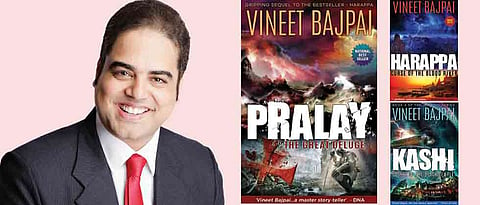

Vineet Bajpai perhaps didn’t intend to refresh History lessons learnt in school. But the tales that he has spun in his trilogy — Harappa, Pralay and Kashi — do make us ponder. Therein lies the strength of his writing and that of the characters he has chosen to narrate the story of Harappa, Mohenjo-Daro, Devta and Asuras.
The stories also have resonance in the popular consciousness because of the ongoing debate in the political and social sphere about the excavations at the Rakhigarhi site. Who were the Aryans? Where did they come from? These two questions have been partly answered in Bajpai’s two books —Harappa — Curse of the Blood River and Pralay — The Great Deluge. Accurate or not, well, we certainly liked joining the dots.
So our first question to Bajpai is what drew him to mythology and Hindu philosophy? “Hindu mythology and even ancient or medieval Indian history are both under-explored when it comes to art forms, be it literature or cinema. Most of the work we see around is simply interpretation and reinterpretation of the same characters over and over again. While our epic idols like Lord Rama, Lord Shiva, Sita, Draupadi, Karna, Ashok and Chanakya have been written about by several authors, large chunks of Indian mythology and history remain untouched. For example, we have no work done around puranic tales like the Samudra Manthan. Hardly any fictional work has been done around powerful mythical characters like Sahastrabaahu Arjun, the thousand-armed warrior. Moreover, large swathes of our history have been omitted by authors over the last few decades. It will be hard to find too many works of fiction around, say the 16th century Goa Inquisition, the Vijayanagara Empire or even the Revolt of 1857,” he says.
The entrepreneur-turned-author adds that he felt a strong urge to use mythology and history as backdrop, but create absolutely new characters that readers connect with emotionally. “The Harappa trilogy was the most logical outcome — with a powerful mythological backdrop, a strong underpinning of Indian history and a parallel modern-day storyline that is a racy crime-thriller.”
The trilogy spans many centuries with several voices from the ancient and the contemporary world carrying forward the story, making it a difficult and complex work to write. “It’s because of this vastness and complexity that I felt that someone far more intellectually accomplished than me was holding my hand and guiding my pen as I wrote the books. Some readers have very kindly pointed out that the Harappa trilogy is perhaps the only work of fiction in India that defies genre categorisation. Is it mythological fiction? A historical novel series? A religious thriller? A contemporary mystery? A modern-day plot around crime syndicates? Fantasy? Horror? What is it? The Harappa trilogy is an intense combination of all of the above.”
Now that the third book in the series is out, readers are demanding another sequel. Bajpai agrees that it is a possibility. Would he say that after a point book/s belong to the readers? How much control does an author have over his book and how the story flows or concludes? He replies, “I am my readers’ writer. Whenever I sit down to write, I think about what is going to make an impact on my reader. Will my book make her laugh? Will it entertain her? Will it thrill him? Will my work give him hope? Will the characters instil courage? Will the story touch hearts? This connection between my readers and me is mutual. Resembling a burgeoning cult-following, my readers are identifying with characters, sending me suggestions, expressing their annoyance at certain turns of events, imploring that some characters must not die, appreciating the loving elucidation of Hinduism, some of them criticising the violence of the battle scenes... the response is mind-numbing. One lady wrote that seeing the fall, the struggle and the rise of the character of Satyavrata Manu gave her courage and hope as she looked after her ailing mother. It is messages such as this that make everything worthwhile for a writer.”
Hundreds of people have written to Bajpai insisting that he release the sequel to Kashi as soon as possible. They want to read what happens to Vidyut, and to the world once Lucifer arrives. “I have announced the next part of the series. It will be titled Dhoomketu — Oceans on Fire and should be launched end of 2019,” he adds.
Currently, he is being published by Tree Shade Books. His Dhoomketu too will be published by the same firm. Bajpai is also in conversation with two film production houses for the cinema or web-series rights of the Harappa trilogy.
